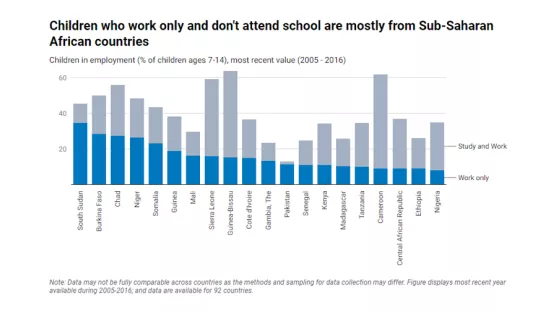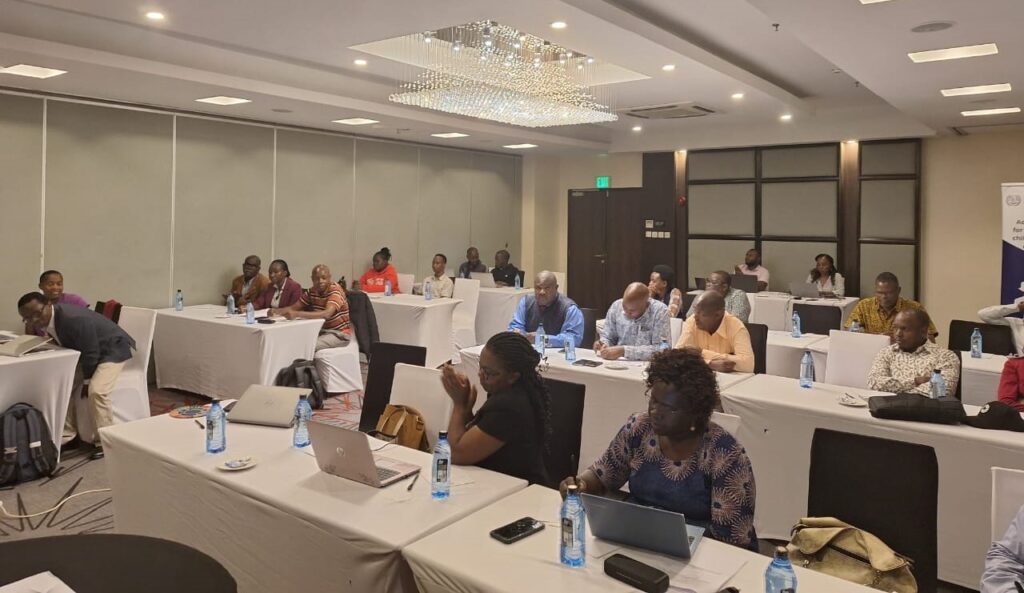The International Labour Organization (ILO) has launched a five-year project aiming to tame child labour in Kenya.
The project funded by the Netherlands government will focus on strengthening child protection policies and frameworks, innovative interventions targeting social protection of children, and knowledge sharing on best practices in the global labour market.
According to the latest reports by the Kenya National Bureau of Statistics (KNBS), 8.5 percent of children in Kenya (1.3 million) are engaged in child labour, with the highest rates of the menace reported in arid and semi-arid land (ASAL) counties (at above 30 percent).
ILO’s ACCEL Project noted that child labour in Kenya primarily occurs in informal production, specifically in the agricultural sector, especially tea and coffee value chains.
The organization has identified four counties; Kisii, Kirinyaga, Kericho and Meru for the implementation of the project titled Accelerating Action for the Elimination of Child Labour (ACCEL) Africa.
In Kenya, the project aims to eliminate Child Labour in the Tea and Coffee value chain.
Uganda and Malawi are some of the countries where the first phase of this project was conducted, and we will work on having our tea and coffee farmers visit these countries for knowledge sharing on best practices
Hellen Rintari, National Project Coordinator for ACCEL Africa
The ILO-ACCEL Africa Project on January 29, hosted stakeholders in the child protection sectors within Kisii County at a Kisumu hotel for an engagement aimed at laying out ground work in the preliminary stages of the project.
Hellen Rintari, National Project Coordinator for ACCEL Africa said despite the country having robust laws and regulations on child labour, enforcement as been a huge challenge.
The project is therefore expected to commence with a household survey in the four counties, in a fact finding mission focusing on exploring the forces behind the vice before commencing a massive multisectoral intervention.
“Uganda and Malawi are some of the countries where the first phase of this project was conducted, and we will work on having our tea and coffee farmers visit these countries for knowledge sharing on best practices,” said Rintari.
She noted that other interventions will include participating in social protection programs for families affected by child labour, as well as empowering youths in the area with necessary skills to enable them have decent work.

Kenya’s tea and coffee exports
The project will also see a robust training and capacity building of stakeholders in the child protection sector, so as to facilitate enforcement of the protection measures.
“We also want to revive child labour committees at the sub county levels, and empower them to perform their duties well,” she said.
When children are engaged in labour, there are a lot of violations, which include underpayment, safety risks, harassments and other forms of exploitation
Teresa Wabuko, COTU
Kenya is the world’s leading exporter of tea and the third largest producer, after China and India. The tea industry makes an important contribution to the Kenyan economy, with an export value of USD 1.2 billion in 2019, and supports about five million people directly and indirectly.
An estimated 650,000 small-scale farmers depend on tea, making the industry one of the leading sources of livelihood in the country. Coffee is also a major agricultural export for Kenya and is primarily grown by smallholder farmers.
Ms Rintari notes that child labour is mostly reported in the small scale schemes as opposed to large scale estates where more labour inspectors are deployed, and can easily arrest the situation.

With the government currently struggling to achieve 100 per cent transition from primary to secondary school, Kisii South Deputy County Commissioner Grace Ouma said the project could not have come at a better time.
“As gatekeepers, we have structures from the village level and we have been trying to ensure that children go to school, and are protected from harmful practices,” she said.
Currently, the government is struggling to find the whereabouts of over 100, 000 2023 Kenya Certificate of Primary Education (KCPE) candidates who are yet to join Form One, with stakeholders fearing that some could have been consumed in illegal labour.
Tea and coffee from Kenya are included on United States Department of Labor’s (USDOL) list of Goods Produced with Child Labour, and Central Organization of Trade Unions (COTU) notes that should Kenya continue to score poorly on child labour, its exports may suffer global market punishment.
Child Exploitation
COTU’s Teresa Wabuko who attended the stakeholders forum wants the government to deploy sufficient labour inspectors to help with the war against child labour.
“When children are engaged in labour, there are a lot of violations, which include underpayment, safety risks, harassment and other forms of exploitation,” she said.
Christine Otieno who represented Labour Directorate’s Child Labour Division noted that the policy on child labour is currently undergoing review, with the ACCEL project expected to form part of the input.
“Poverty is the biggest challenge in eliminating child labour,” she said.
Her sentiments are echoed by UNICEF-published Kenya Child Poverty Report, which indicates that child poverty rate reached 45 per cent in 2017, indicating that approximately 9.5 million Kenyan children faced severe deprivation in terms of three or more basic well-being needs.
The vulnerability of many Kenyan families to economic hardships is exacerbated by various factors such as destabilizing pandemics, famine, global economic downturns, and civil conflicts, among others.
Moreover, the absence of effective socio-economic safety nets within existing social protection programs and initiatives has further exacerbated the issue of child labor in Kenya.
But Rintari expressed confidence in the ACCEL project which she said will make a huge impact in the fight against child labour.
